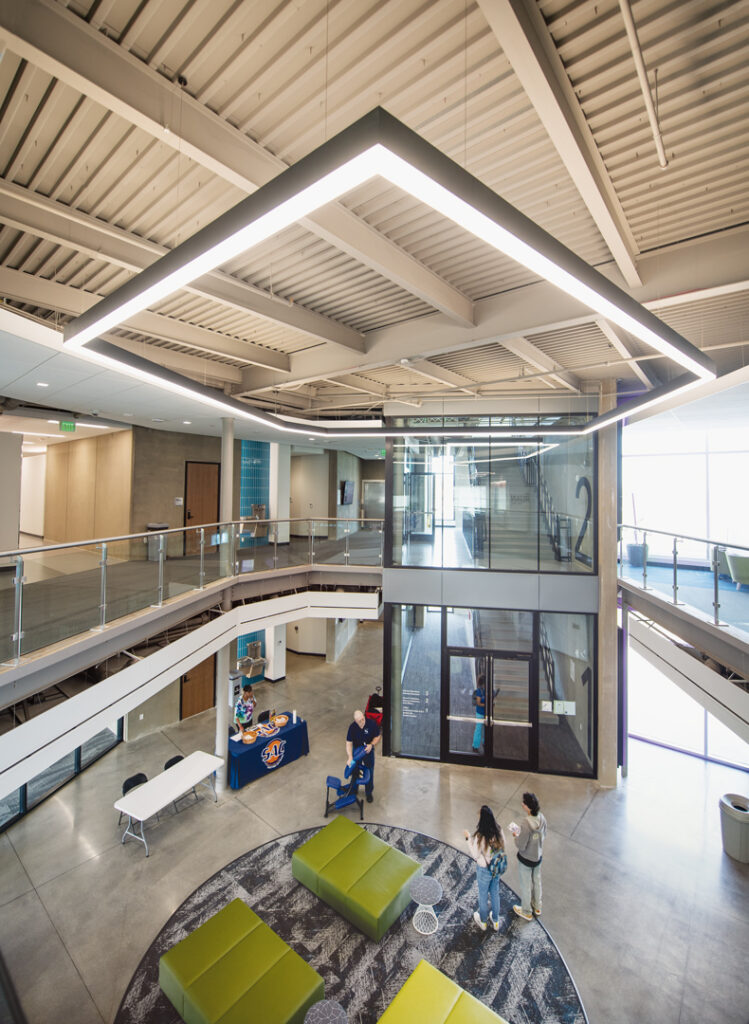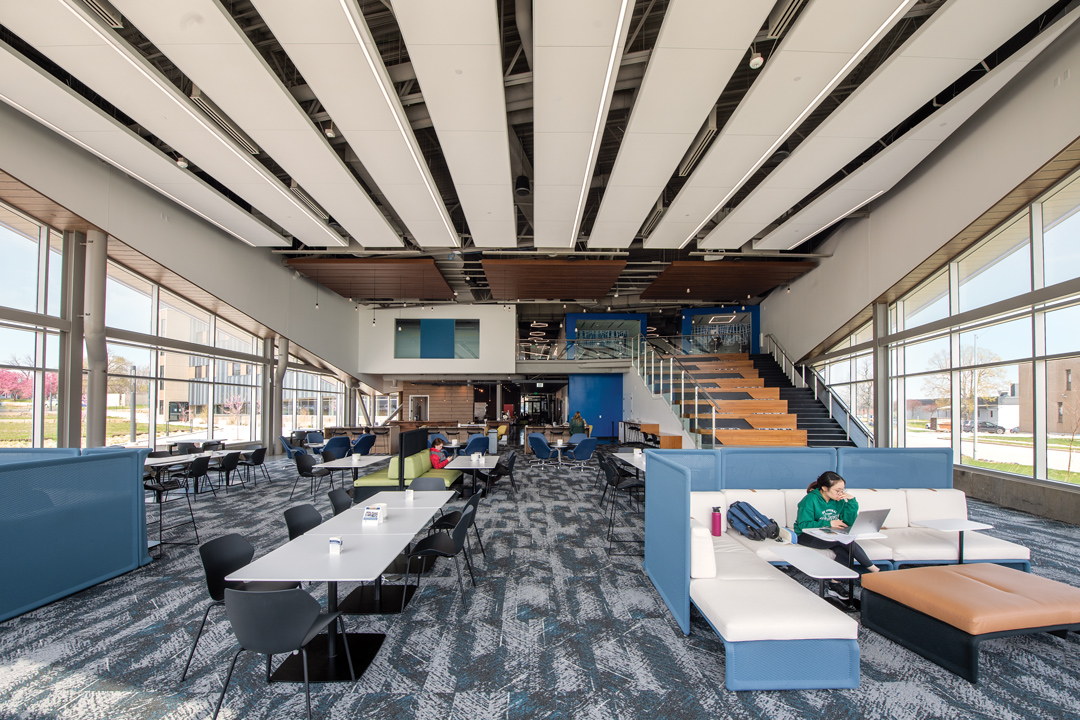The school district, community college and four-year university will pursue more collaborations to develop education talent pipeline
The University of Northern Iowa, Des Moines Public Schools and Des Moines Area Community College are engaging with existing and new relationships to create pathways that develop educators for Iowa.
The DMACC Foundation held a ribbon-cutting and open house April 27 on the DMACC Urban Campus to celebrate the new Student Life and STEM Center, which will help host a new partnership announced by UNI and DMPS.
UNI is expanding its master’s degree and advanced studies certificate in principalship to include a cohort specifically for DMPS educators seeking endorsement in Iowa as a principal or supervisor of special education. The hybrid program, named the Purple Pathway for School Administrators, launches in fall 2023.
Peter LeBlanc, the school district’s director of talent support, told the Business Record that DMPS is continuously looking for ways to develop and retain its existing talent as it sees fewer high school graduates pursue the education field.
“While we have been able to successfully find administrators for all of our buildings, we have seen a reduction in the number of applicants who apply,” LeBlanc said. “We’ve been charged here in Des Moines Public Schools to recruit candidates who are representative of our student population, and that is the thing that we are finding the most difficult in today’s times.”
LeBlanc, who joined DMPS in 2021, oversees the district’s internal talent development program. Its role, he said, is about providing a “menu” of growth opportunities to DMPS employees so they can choose what fits their goals and needs.
Across the country, school districts are seeing turnover among school administrators as well as teachers, said Colleen Mulholland, dean of UNI’s College of Education. She said it’s an important issue for Des Moines as research shows turnover is often higher in urban school districts.
“Just like the most important factor in the classroom is a teacher, the most important factor in a school is its leader,” Mulholland said.
The university and school district have tailored the program to reflect the mission and vision of DMPS. LeBlanc said in practice that will include looking at how to support and develop staff and leaders’ role in a culture of “learning, thriving and belonging.”
“What are the leadership skills that one needs to have to lead diverse buildings with diverse learners?” he said. “And really thinking about how you go about showing up as a leader to be supportive of your staff and creating the conditions within a building to build capacity in your staff so that they feel like they have the ability to go out and do the job that they need to do and they have the the knowledge, skills and abilities to do that.”
The program will prioritize “on-site skill development” and bring in perspectives from school administrators from in and outside Des Moines, including assigned mentors for each participant.
LeBlanc said DMPS is financially supporting the program, and the educators who participate will make a commitment to stay with the district.
Educators will qualify for their conditional license after the first year, allowing them to work in administrative roles while finishing the second year of the program. With their master’s degree they will be eligible for principal or associate principal roles but also positions like transportation director, at-risk director and special education roles.
The district’s talent development partnerships have helped increase retention, but the workforce also needs new educators long-term.
According to the Board of Regents’ fall 2022 enrollment report, nearly 4,000 students were enrolled at teacher preparation programs at Iowa’s regent universities. The report said UNI educates 54% of all teachers produced by a regent university in the state although enrollment in its teacher preparation programs has declined each year since 2018. Iowa State University saw enrollment increase in 2022 following several years of decline and the University of Iowa has experienced steady growth in recent years, the report shows.

‘Just the beginning’ of partnerships
The UNI@DMACC program that started in 2019 to help placebound DMACC students earn a bachelor’s degree from UNI served as a springboard for discussions about further ways to support the education workforce pipeline. DMPS joined the conversations to contribute the K-12 perspective.
“Sometimes there are mutually beneficial partnerships, but this is really true and authentic around our missions being the same and growing talent to lead and not leave the classroom. … When there’s a strong leader leading a school, it really is a thriving school community, which then leads out into the actual community,” Mulholland said.
LeBlanc said this partnership is “just the beginning” as the institutions work on initiatives that support career development at every stage, from students entering college to those seeking a doctoral degree.
He said partnering with community colleges and universities could keep DMPS students who pursue a career in education connected with the district throughout college and make it attractive to return to the district to work.
“When I think about the future, and I think about long-term how we get past the shortage, the long-term strategy has got to be thinking about the young folks who are walking into our classrooms today,” he said.
UNI and DMACC’s efforts to support teacher preparation pathways include UNI President Mark Nook asking the Iowa Legislature for $4 million to offset tuition costs during the student teaching semester as well as DMACC Urban Campus hiring new faculty for its education program.
“We knew for a long time that we needed to add an education faculty line, but then to have these conversations with UNI and DMPS — now was an opportune time,” said DMACC Urban Campus Provost Anne Howsare Boyens.
‘Building Community’ at DMACC Urban
In addition to serving a role in community partnerships, DMACC Urban’s new Student Life and STEM Center, or Building 7, was built to help create space that is comfortable and encourages students to spend time on campus.
“Before Building 7, we had very few quiet study areas, we had very few places for students to just hang out, get something to eat between classes, grab a cup of coffee,” Howsare Boyens said.
Now, there is a coffee shop, student lounge areas and private study rooms. Biology and chemistry labs, the Student Services Department and the UNI@DMACC program office are also housed in the 60,000-square-foot building.
Art was a feature that students, faculty and staff said they wanted in the building when DMACC began planning the construction. Two LED panels affixed to the building’s exterior fulfill that request, showcasing a rotation of local and national art.
The $24 million building is part of a multiyear expansion and renovation project at the Urban Campus called “Building Community.” Building 1 also recently had a $2 million renovation as part of the project to create study spaces and make the library and tutoring center more visible. Both buildings are the only ones on the downtown campus that were built for DMACC; the others were acquired and therefore didn’t lend themselves to creating a campus feel.
“A lot of it was building, parking lot; building, parking lot so it was very much set up for a commuter college,” Howsare Boyens said.
An alleyway that cars would speed down was replaced with a pedestrian walkway. The campus is also getting additional signage and lighting and new green space.
About the UNI@DMACC program
Launched in 2019, the UNI@DMACC program offers DMACC students who can’t leave Des Moines to attend UNI the ability to complete their bachelor’s degree online.
The partnership is a 20-year agreement that includes a commitment from UNI to pay $500,000 per year over the first five years of the partnership to help DMACC pay for the new facility at the Urban Campus.
Another long-standing partnership between the schools led to UNI@DMACC. For 25 years, they have offered the 2+2 elementary education program, making it easier for students to transfer from DMACC to UNI. UNI@DMACC makes the education program and seven others accessible to a new audience in Des Moines.
The degree programs include criminal justice, business management, human services and the hybrid accounting program that starts in fall 2023. UNI accounting professors will travel one night a week for in-person classes at the DMACC Urban Campus.
About 100 students were enrolled in the UNI@DMACC online bachelor’s degree completion programs in the spring semester.
In 2022, UNI announced the UNI@IACC (Iowa Community Colleges) program to expand the offering to placebound students across the state. So far, UNI support specialists have been added at Western Iowa Technical Community College in Sioux City, Iowa Western Community College in Council Bluffs and Indian Hills Community College in Ottumwa.
